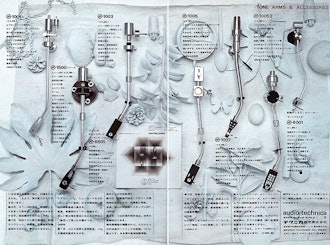Click to view our Accessibility Statement or contact us with accessibility-related questions























Showing 1 of 35 conversations about:

GrizzledGeezer
50
May 19, 2018
bookmark_border
macdane
13
May 22, 2018
bookmark_border
GrizzledGeezer"I doubt any of these amps is sonically neutral (which you'd expect at such unbelievable prices), making them poorly designed."
Um, what? If your utterly unfounded doubt had any basis in reality you'd be largely right, but it's absurd to make such a statement without backing it up. Care to fill us in on why you doubt they do what "you'd expect" them to do?
Um, what? If your utterly unfounded doubt had any basis in reality you'd be largely right, but it's absurd to make such a statement without backing it up. Care to fill us in on why you doubt they do what "you'd expect" them to do?

GrizzledGeezer
50
May 22, 2018
bookmark_border
macdaneI knew I'd get hit on this, and would have to offer some justification . Here goes...
As both consumer and reviewer, I'm not obliged to assume any product "gets it right". "Right", in the case of amplification, is neutrality. What comes out is sonically indistinguishable from what went in.
Why would anyone -- designer or listener -- want anything else? Why would someone put a device in their system that audibly colored every recording they played?
Perhaps some listeners prefer such colorations. It's their money, so why shouldn't they choose what pleases them? Loudspeakers vary sufficiently in accuracy and character that, if one desires a certain sound (or lack thereof) one can likely find it. There's no need to sonically compromise the amplfier.
To design such a compromised amplifer, in the hope its distinctive sound would attract buyers, is not only aesthetically wrong, but morally unjustifiable.
I realize I've danced around your objection. My unproven argument is this... I suspect most Horribly Expensive amplifers were designed to prove a technical point, not necessarily have any particular sound quality.
I'm curious to hear the opinions of listeners as fussy as I am about absolute neutrality. How do current amplifiers, in all price classes, stack up in terms of neutrality?
As both consumer and reviewer, I'm not obliged to assume any product "gets it right". "Right", in the case of amplification, is neutrality. What comes out is sonically indistinguishable from what went in.
Why would anyone -- designer or listener -- want anything else? Why would someone put a device in their system that audibly colored every recording they played?
Perhaps some listeners prefer such colorations. It's their money, so why shouldn't they choose what pleases them? Loudspeakers vary sufficiently in accuracy and character that, if one desires a certain sound (or lack thereof) one can likely find it. There's no need to sonically compromise the amplfier.
To design such a compromised amplifer, in the hope its distinctive sound would attract buyers, is not only aesthetically wrong, but morally unjustifiable.
I realize I've danced around your objection. My unproven argument is this... I suspect most Horribly Expensive amplifers were designed to prove a technical point, not necessarily have any particular sound quality.
I'm curious to hear the opinions of listeners as fussy as I am about absolute neutrality. How do current amplifiers, in all price classes, stack up in terms of neutrality?
macdane
13
May 22, 2018
bookmark_border
GrizzledGeezerRight off the bat, I agree that you have no obligation — in any context — to assume that a given product "gets it right." But that doesn't mean it's reasonable to assume they do NOT get it right. Right? And that's what you've done here, with the only justification being a suspicion that amps like these are designed for something other than a sonic purpose. Now, if after actually listening to a number of products in this arena and finding them to be inexcusably colored-sounding, I think you'd be justified in voicing certain generalizations based on those experiences. But so far this is all just a series of "hunches." First, that these amps' designers had priorities other than sonics; and, second, that those other priorities carry some inherent threat to the sonics.
Your other questions are good ones. I don't necessarily share your view that neutrality is the holy grail of amp design — and find it laughable to suggest that there's any moral issue with a non-neutral amp! — but there's room for both you and I to be "correct" in our preferences. In this pursuit of home sound reproduction, some seek neutrality while others pursue things that tickle their pleasure centers. Who's right and who's wrong? Yes.
Your other questions are good ones. I don't necessarily share your view that neutrality is the holy grail of amp design — and find it laughable to suggest that there's any moral issue with a non-neutral amp! — but there's room for both you and I to be "correct" in our preferences. In this pursuit of home sound reproduction, some seek neutrality while others pursue things that tickle their pleasure centers. Who's right and who's wrong? Yes.

GrizzledGeezer
50
May 23, 2018
bookmark_border
macdaneThere's a related issue there's no time to go into -- how do we know what an amplifier sounds like? My publisher once said that, if you can accurately describe the sound of any product, that's all that was needed; the customer would make the value judgment. Correct. So when he asked me to judge a bunch of modestly priced amp, I created a "fixture" to run a bypass test that would hopefully reduce testing confusion. When he found out, he cancelled the project, apparently because he didn't want any "objectivity" in the testing.
Valid subjective testing (of which double-blind ABX auditioning is not a part) is hard to do correctly, so nobody bothers. "I heard the difference, so it must be there." (Hearing gross differences one day that vanished the next was what drove me out of reviewing.) The designer of a $100K amplifier is obliged to describe its sound character (if any) and give some reasonable evidence his description is valid. If he can't, then why is he designing amplifiers?
Valid subjective testing (of which double-blind ABX auditioning is not a part) is hard to do correctly, so nobody bothers. "I heard the difference, so it must be there." (Hearing gross differences one day that vanished the next was what drove me out of reviewing.) The designer of a $100K amplifier is obliged to describe its sound character (if any) and give some reasonable evidence his description is valid. If he can't, then why is he designing amplifiers?
macdane
13
May 23, 2018
bookmark_border
GrizzledGeezerI have no issue with objectivists unless and until they impose their values and priorities on others. Up to that point, it's just another approach to evaluating a given component. I am a subjectivist, believing the only rational goal in home hifi is to assemble a system that pleases me. That is, after all, the only reason for such a pursuit. I've simply heard too many components that measure well but sound bad to believe we've yet figured out how to measure the intricacies the human ear and brain are capable of experiencing, especially over the long term. So we're not likely to see eye-to-eye here.
As to the question of whether a designer has some duty to describe, with evidence, the sound of his amp ... I naturally disagree. Along those lines, one of my favorite descriptions comes from right here on Massdrop: "notice every note like never before, adding a dimension of accuracy that’s usually cloaked in distortion ... warm mids ... analytically detailed highs, and fully transparent bass." Wow! So *everything* is better, if not *more* better!
I share your healthy skepticism of these über amps to a degree, Geezer. There's zero chance any of them deliver performance commensurate with their prices. If audio performance was their sole reason for being, we could go around in circles about what serves as the best indicator ... measurements or sound? That's clearly not the only reason these things are made, but my point remains that there's no basis for assuming that they don't sound great.
As to the question of whether a designer has some duty to describe, with evidence, the sound of his amp ... I naturally disagree. Along those lines, one of my favorite descriptions comes from right here on Massdrop: "notice every note like never before, adding a dimension of accuracy that’s usually cloaked in distortion ... warm mids ... analytically detailed highs, and fully transparent bass." Wow! So *everything* is better, if not *more* better!
I share your healthy skepticism of these über amps to a degree, Geezer. There's zero chance any of them deliver performance commensurate with their prices. If audio performance was their sole reason for being, we could go around in circles about what serves as the best indicator ... measurements or sound? That's clearly not the only reason these things are made, but my point remains that there's no basis for assuming that they don't sound great.

GrizzledGeezer
50
May 23, 2018
bookmark_border
macdaneAs someone who listens primarily to acoustic music (which is a polite way of saying I'm a classical snob), I don't want the playback system "editorializing". In principle, if every component in the recording and playback chain were neutral, the listener would hear any and all kinds of music reproduced exactly as its creators intended. That's why I'm such a fuss-budget about neutrality -- it benefits everyone. In principle. Practice is another matter.
macdane
13
May 23, 2018
bookmark_border
GrizzledGeezerFair enough. As another someone who listens primarily to acoustic music (folk, bluegrass, and jazz are as much a part of my menu as classical), I get where you're coming from. I may not be as much of a stickler as you in the "neutrality vs editorial" debate — so long as any colorations lean in a direction that sounds good to me — but I'll maintain that there's no good way to measure the sound of an amp (or soundstaging ability, or a number of other important factors), and there's still no justification for presupposing that ultra-costly amps miss the mark sonically. You simply must listen to them to know.

GrizzledGeezer
50
May 23, 2018
bookmark_border
macdaneWhich, of course, returns us (in an arguably vicious circle) to the problem that measurements are mostly meaningless unless we "know" what the amplifier sounds like. But proper subjective testing is difficult, and designers tend to believe that "better" measurements equate to "better" sound, however one defines "better".
My attempts to get my publisher to perform long-term listening tests to (hopefully) start casting some light on the truth fell on deaf ears.
The kind of testing needed to determine the real differences between analog and digital, how much measurable distortion is actually audible, would be insanely complex and horribly expensive. So nobody does them -- they just assume.
My attempts to get my publisher to perform long-term listening tests to (hopefully) start casting some light on the truth fell on deaf ears.
The kind of testing needed to determine the real differences between analog and digital, how much measurable distortion is actually audible, would be insanely complex and horribly expensive. So nobody does them -- they just assume.

GrizzledGeezer
50
Jul 10, 2018
bookmark_border
macdaneProperly designed listening tests would enable us to properly evaluate the "sound" of individual componets. It would then be possible to attach meaningful specifications (as you point out in your post beloe.)
Related Posts

storyboardtech
Finding your groove: getting into vinyl with Audio-Technica
I’d like to think that I could’ve been friends with the late Hideo Matsushita, founder of Japanese Hi-Fi powerhouse Audio-Technica. If I could, I’d travel back in time to 1960’s Tokyo, where a young Matsushita curated “vinyl listening sessions” at the Bridgestone Museum of Arts, exposing visitors to the sounds and possibilities of high end audio and the warmth of vinyl records. I imagine sitting with him in a mod coffee shop, listening to the stories of what he witnessed in those sessions, the conversations he had with visitors, and what ultimately motivated him to head back to his small apartment above a ramen restaurant and start an audio company of his own. In the histories I’ve read regarding AT’s humble beginnings, Matsushita’s motives seem clear. Produce high end audio at affordable prices, bringing audio excellence into spaces and to customers that simply didn’t have access to it before. His first two products, the AT-1 and AT-3 phono cartridges did exactly that, and...
Dec 6, 2023
bizarcane
I'm interested to learn about the fit of these IEMs; from an outward appearance, they look like they're designed to pop right out of the ear. I can't see a structure that might help them sit within the ear well. Anyone have insight here?
Apr 19, 2024

Paulskii
Are there any official/unofficial replaceable headbands/head cushion for the DT 177X GO? My current one has gone through some wear and tear and is in need of being replaced. Anybody have any sources they can share?
Apr 19, 2024

monte543
This says "Estimated ship date is April 19." Is it still ok for me to make the purchase on the 20th or 21st?
Apr 16, 2024

Viltaria
Would Drop be able to provide power-adaptors (plugs) for those based in other regions (Euro, Oceania, Asia, etc)?
Apr 14, 2024
Trending Posts in Audiophile

Simthaniel
Rigs
Modded headphones with qudelix at the core
When I received the Qudelix 5K, I had already modified a pair of Superlux HD-681 headphones. I previously soldered my own balanced connections to the drivers, providing multiple ways to connect and...
Apr 14, 2024

brothamike
A decent set of IEMs
I am in the midst of a 300 hour burn-in but, I will say I am enjoying how this set sounds so far. Before I received these which was btw late by a few weeks, I purchased a Sony/Kimber Kable MMCX...
Apr 12, 2024
merrick97
Should I exchange the PC38X for better headphones?
I bought the PC38X headphones FOR GAMING and they are great, but I have NO use for a Microphone since I don't do competitive gaming and I was wondering if there were better headphone options at a similar price without a headphone, where (presumably) more of the cost was put into making it sound better. I also find that my PC38X don't get quite as loud as I would like and I was wondering if a cheap amp like the iFi Go link would draw a little more volume out of my phones. https://www.amazon.com/dp/B0BN6MM822?psc=1&ref=ppx_yo2ov_dt_b_product_details I went with the PC38X since it was considered the best bang for buck headphones. I care most about using spatial apps like DOlby Atmos and DTS Headphone:X. Suggestions are welcome.
Apr 11, 2024

LostnAmerica
Sound Signature of the Grell Project.
Wondering what type of sound signature the Drop Grell project headphones will have or trying to attain. Any update would be appreciated.
Apr 8, 2024

Fabulous
Looking for a gaming/content audio setup
Hello! I'm looking for recommendations on audio setups. I'd be planning on using it mostly for gaming. Preferably I'd like a pair of large closed back headphones since I have a big head and jaw. I'd also like to hear myself through my mic with mic monitoring. As far as budget goes, I don't really have one. But under 600$ would be nice. I can go higher if needed. The audio setup would be connected to a high performance PC. Thank you in advance for any recommendations!
Apr 4, 2024

1plsd
$10 Drop Coupon Email not sent?
Trying to buy some gear off Drop for the first time. I was told I would receive an email with a welcome to drop $10 off promo. I never received that email. Drop was able to send me emails for my login token and email for Password update. But for some reason the $10 off coupon was never sent to me.
Mar 31, 2024

NMPacella
New here
Hello, I just joined, primarily for the audiophile products. Looking at purchasing the NHT C3 speakers for our new living room. Space is about 15 feet wide by 33 long and they will fire long ways. Space is just for general listening, music room with all equipment is downstairs, so hoping they will fill it with sound nicely. Cheers.
Mar 18, 2024




This article by Nelson Pass seems to make sense:
https://www.passlabs.com/press/leaving-class
An amplifier should be transparent, neither adding to or subtracting from the signal. If it comes close (with only minor audible errors) for $1500, it's a well-designed amp. I doubt any of these amps is sonically neutral (which you'd expect at such unbelievable prices), making them poorly designed.
As for response extending well beyond 300kHz, I can only quote Michael Flanders: "All the highest notes, neither sharp nor flat -- the ear can't hear as high as that! Still, I ought to please any passing bat."